Find out more about The Open University's Geography courses and qualifications
Trees have been in the news a lot recently with political parties trying to outdo each other on tree planting pledges. As the climate crisis has risen up the political agenda, trees and tree planting have been recognised as an important response since they take up carbon dioxide from the atmosphere as they grow. A recent study [1] found that a global tree planting effort aimed at increasing tree cover by 0.9 billion hectares would help to remove two-thirds of all human-produced carbon dioxide.
But amid the clamour for more trees, for the many people involved in looking after trees and woodlands the over-riding concern is that we aren’t taking enough care of our existing trees. Part of the problem is that we simply do not know enough about the trees that we have, this is particularly true of urban trees. In fact we know less about trees in towns and cities than we do about those in the wider countryside, despite many urban areas having a higher tree canopy cover than much of the countryside.
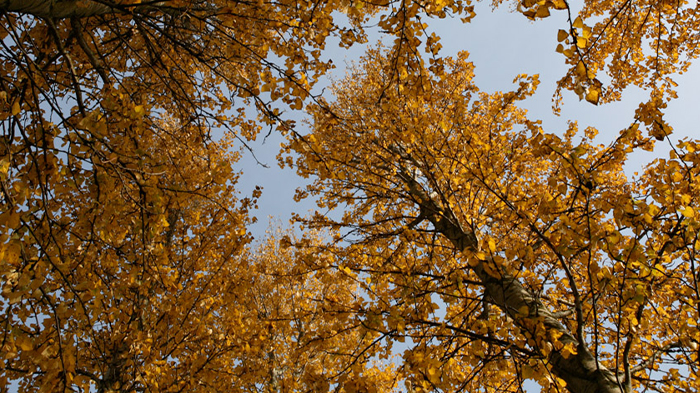 Poplars in autumn, taken at Teardrop Lakes in Milton Keynes.
Poplars in autumn, taken at Teardrop Lakes in Milton Keynes.
As well as taking in carbon dioxide, urban trees provide a number of important benefits to the more than 80% of the UK population that live in towns and cities. Trees take-up air pollution, help reduce flood-risk by increasing the evaporation of rain before it reaches the ground and channeling water into the soil instead of letting it flow over the surface. Trees also reduce the ‘urban heat island’ effect, making cities cooler in the heat. So they can both help to address the causes of climate change and to mitigate its effects. More than this, urban trees are vital parts of our natural and cultural heritage: think of the Plane trees that line the Mall in London or the Sycamore tree at Hadrian’s Wall, one of the most photographed trees in the UK.
Trees also play an important role in supporting our mental as well as physical well-being. With all these benefits, you might think that urban trees are well documented, cared for and protected, but this couldn’t be further from the truth. Despite recent commitments to planting and spending on maintenance, urban trees are very poorly monitored and it’s not known whether the amount of urban tree canopy is increasing or decreasing [2]. What is known is that the average lifespan of an urban tree is substantially less than its rural counterpart, and urban tree-felling in some places greatly exceeds the recommended rate and has resulted in public protests.
Treezilla saw the entry of its one millionth tree record in the database which equates to annual benefits (e.g. air pollution, storm water filtration) worth £95 million.
Insufficient urban tree data for monitoring reflects issues with land ownership, (many trees are privately owned and therefore not routinely monitored), and inconsistent data collection methods used by tree officers employed by local authorities. Furthermore, many local authorities do not have comprehensive tree inventories and only a tiny fraction of the inventories that do exist are publicly-available. In 2013 Treezilla was created, a citizen science project which aims to map every tree in the UK and make the data publicly-available, with the aim of being a one-stop-shop for urban tree data for use by the public, researchers, government and business. However, a dataset of the right information compiled using consistent methods allows us to estimate the benefits of urban trees thereby answering a number of critical questions that would help to leverage more funding support to protect our urban forests.
In June 2019 the Geospatial Commission awarded funding for members of the Treezilla team and other partners to address the issue of the fact data is collected in an inconsistent way and secondly the lack of urban tree data. Through a series of workshops and consultations with the urban tree stakeholder community the project will produce guidelines for carrying out tree surveys with the aim of standardising the way in which urban tree data is collected. Secondly, the project will produce a new optimised Treezilla website and mobile app that will improve the whole data collection process for amateur tree data collectors through to the more experienced data collector.
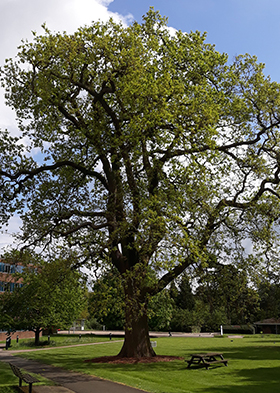 Trees at the Open University in Milton Keynes.
This month (November 2019), just in time for the annual National Tree Week [3], Treezilla saw the entry of its one millionth tree record in the database which equates to annual benefits (e.g. air pollution, storm water filtration) worth £95 million [4]. Of course the wider value of a tree is much more than these physical processes. And as we develop the tools in the site we are also incorporating methods for assessing the amenity value of a tree, based upon the widely adopted CAVAT tool. But there will always remain other intangible values that we as individuals attach to trees around us. We don’t need to quantify the meaning of the local children’s favourite climbing tree, or an ancient oak in a village green to understand their value. Perhaps it is these values that should be the real reason that we do all that we can to protect, maintain and enhance our urban trees. And to do that we must start with mapping them!
Trees at the Open University in Milton Keynes.
This month (November 2019), just in time for the annual National Tree Week [3], Treezilla saw the entry of its one millionth tree record in the database which equates to annual benefits (e.g. air pollution, storm water filtration) worth £95 million [4]. Of course the wider value of a tree is much more than these physical processes. And as we develop the tools in the site we are also incorporating methods for assessing the amenity value of a tree, based upon the widely adopted CAVAT tool. But there will always remain other intangible values that we as individuals attach to trees around us. We don’t need to quantify the meaning of the local children’s favourite climbing tree, or an ancient oak in a village green to understand their value. Perhaps it is these values that should be the real reason that we do all that we can to protect, maintain and enhance our urban trees. And to do that we must start with mapping them!
To help build the Monster Map of Trees, visit the Treezilla website: www.treezilla.org. Look out for a new, quicker, slicker site and apps in time for mapping trees next spring / summer 2020! If your organisation has data you might like to add to the site, or if you are involved in collecting data on urban trees and are interested in contributing to the data standards consultation, contact treezilla@open.ac.uk.
Further reading and references
[1] Bastin et al. (2019) The global tree restoration potential. Vol. 365 (6448) pp. 76-79.
[3] 23 November to 1 December 2019, is National Tree Week, the UK's largest annual tree celebration, marking the start of the winter tree planting season. Why not join in this year? Be a #TreeChampion this #NationalTreeWeek: add your local trees to www.treezilla.org or for information on other ways to get involved go to the Tree Council: www.treecouncil.org.uk/Take-Part/Near-You.
[4] This calculation is based on data from approximately 335,000 trees as the remainder of the dataset had insufficient data for ecosystem service economic benefit calculations. We are working to address this data gap.
Study a free related course
-
Citizen science and global biodiversity
Learn more to access more details of Citizen science and global biodiversityThis free course, Citizen science and global biodiversity, deals with the importance of biodiversity and explores how anyone can contribute to and be involved in identifying and recording wildlife, as a citizen scientist. It looks at what citizen science is, and how citizen science facilitates public involvement in scientific research ...

-
Studying mammals: Life in the trees
Learn more to access more details of Studying mammals: Life in the treesDavid Attenborough looks at life in the trees: examining how species have evolved to cope with arboreal living. In this free course, Studying mammals: Life in the trees, you will learn how lemurs, anteaters, bears and many others have developed different methods to help movement and survival.

-
Environment: treading lightly on the Earth
Learn more to access more details of Environment: treading lightly on the EarthEnvironment: treading lightly on the Earth focuses on the problem of greenhouse gas emissions, especially carbon dioxide. This free course will give you an understanding of the nature and importance of carbon footprints of individuals and households. It will enable you to measure your own carbon footprint and explore what you could do to reduce ...

Read more articles like this
-
Weather derivatives - the financialization of weather
Listen now to access more details of Weather derivatives - the financialization of weatherIs it possible to manage the risks presented by nature, such as too much rain at the wrong time of the year and very harsh frosts?

-
The European Union and the impact on mixed nationality relationships in northern Finland
Listen now to access more details of The European Union and the impact on mixed nationality relationships in northern FinlandCarol Brown-Leonardi investigates how Britain’s exit from the European Union has affected the perceptions and decision-making of mixed nationality couples to stay and live permanently in Finland or the United Kingdom.

-
Investigating environmental futures through speculative design
Read now to access more details of Investigating environmental futures through speculative designHow can ‘thinking through making’ facilitate new kinds of geographical enquiry?

-
Climate Change, Coastal Erosion and Flooding: The Thames Gateway and London
Read now to access more details of Climate Change, Coastal Erosion and Flooding: The Thames Gateway and LondonClimate change will lead to sea level rises and this will lead to enhanced coastal erosion. Professor David Humphreys explores the challenges that this will pose for the Thames Gateway in south-east England.

-
Convoy to Calais
Watch now to access more details of Convoy to CalaisHow should we respond to humanitarian crises in other countries? Steve Pile explores the geographies that underlay the 2016 “Convoy to Calais” protest.

-
Kropotkin, anarchism and geography: A discussion
Listen now to access more details of Kropotkin, anarchism and geography: A discussionWhat links geography to anarchism? Dr Philip O’Sullivan finds the surprising connection lies with a Russian prince who died nearly 100 years ago.

-
Sounds of environmental change
Listen now to access more details of Sounds of environmental changeWhat does environmental change sound like? Dr George Revill argues that sound can be a powerful way of conveying how places are transformed by climate change.

-
The sharing economy
Take part now to access more details of The sharing economyHow sharing and caring is the sharing economy? Petr Jehlička takes a critical look at the booming sector and traces its hidden connections and contradictions.

-
From Brexit to the break-up of Britain?
Learn more to access more details of From Brexit to the break-up of Britain?This free course, From Brexit to the break-up of Britain?, sets the experience of Brexit in the context of the UK. It first analyses Brexit as a symptom of the political, economic and social geography of the UK, focusing on its uneven development in a country increasingly dominated by London and the South East of England. It then considers how ...

-
Climate change's causes, effects and geographies of responsibility
Read now to access more details of Climate change's causes, effects and geographies of responsibilityThe idea of climate change is increasingly well-known, but it can be hard to understand its effects in human terms. Professor David Humphreys describes how he experienced Climate Change first hand when working in Bangladesh for The Open University.

-
International health service: How the NHS has always relied on overseas labour
Read now to access more details of International health service: How the NHS has always relied on overseas labourPotential NHS staff from outside of European Economic Area (EEA) will shortly find it easier to secure permission to work in the UK. Yet doctors and nurses from the EEA may no longer have the right to do so. Dr Parvati Raghuram looks at how the NHS has depended on foreign workers since its creation.

-
Can we live harmoniously with wildlife?
Read now to access more details of Can we live harmoniously with wildlife?In light of a man-eating tiger being killed in The Nilgiris District, India, we need to address human-animal and human-human conflict in our forests.

-
The navigation apps that help the visually impaired
Read now to access more details of The navigation apps that help the visually impairedA technological revolution is underway improving the lives of many who may benefit from additional assistance says human geographer, Dr Oliver Zanetti.

-
How do you know you are in a smart city?
Watch now to access more details of How do you know you are in a smart city?Integrated urban technology is less apparent when it is functioning well says, Gillian Rose, Professor of Human Geography at the University of Oxford.

-
Studying Environments and Societies
Listen now to access more details of Studying Environments and SocietiesWhat does human geography have to do with studying the environment?
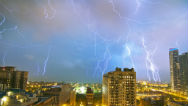
-
How data is making our cities smarter
Watch now to access more details of How data is making our cities smarterData research may lead to more efficient, sustainable and democratic societies says Gillian Rose, Professor of Human Geography at the University of Oxford.

-
Approaching the break up of Britain?
Read now to access more details of Approaching the break up of Britain?What does the geography of the referendum vote tell us about the (increasingly dis-) United Kingdom?

-
Five smart technologies helping the visually impaired
Watch now to access more details of Five smart technologies helping the visually impairedCutting-edge research is enabling the development of new potentially life-changing prototypes aimed at serving those with disabilities says, Dr Oliver Zanetti.

-
Can yoga help us achieve sustainable development goals?
Read now to access more details of Can yoga help us achieve sustainable development goals?Shonil Bhagwat explains the yogic way of understanding how individual actions relate to global challenges.

-
Gender, IT and economic growth
Read now to access more details of Gender, IT and economic growthDoes gender matter to the world's fastest growing economies? Parvati Raghuram explores how the labour driving many Rising Powers is gendered.

-
My Interest in Cities is Really an Interest in the Way People Live
Watch now to access more details of My Interest in Cities is Really an Interest in the Way People LiveHow do cities bring places, relationships and networks together, and what sorts of politics do they create?
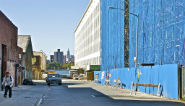
-
Non-existent countries
Listen now to access more details of Non-existent countriesWhat makes a country count as a country? Andy Morris interviews geographer and broadcaster Nick Middleton about his recent book 'An Atlas of Countries that Don't Exist'.

-
United Nations Climate Change Conference - COP21
Take part now to access more details of United Nations Climate Change Conference - COP21This interactive map is a world first. It gives you the chance to explore a major international meeting on climate change as if you were there.

-
Earth In Vision: A Collection
Watch now to access more details of Earth In Vision: A CollectionThe Earth in Vision project explores the BBC archives of environment themed television and radio programmes from the last 70 years, looking at the potential of these archives as a digital resource as well as to illustrate the potential of digital broadcast archives for researchers.

-
Stories of Change - The Interviews
Listen now to access more details of Stories of Change - The Interviews'Stories of Change' interviews with Roger Harrabin.

-
Dropping the population bomb - 50 years of BBC environmental broadcasting, part two
Read now to access more details of Dropping the population bomb - 50 years of BBC environmental broadcasting, part twoHow have the films and radio programmes broadcast by the BBC shaped how we understand environmental change issues? Joe Smith shares his journey through the archives in the second part of a two part podcast series.

-
Fifty years of BBC broadcasting about environmental change issues
Listen now to access more details of Fifty years of BBC broadcasting about environmental change issuesHow have the films and radio programmes broadcast by the BBC shaped how we understand environmental change issues? Joe Smith shares his journey through the archives in a two part podcast series.

-
Syria, Spitsbergen and Seeds
Listen now to access more details of Syria, Spitsbergen and SeedsHow are the civil war in Syria, the remote Norwegian island of Spitsbergen, and the future of the world’s food supplies connected?
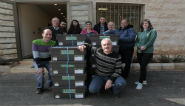
-
The Legacy of Nuclear Power, Part 2
Listen now to access more details of The Legacy of Nuclear Power, Part 2What ethical decisions does burying nuclear waste involve, and how are we responsible to future generations?
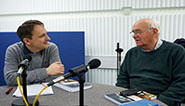
-
Another spoonful? Understanding the Place of Sugar - Part Two
Read now to access more details of Another spoonful? Understanding the Place of Sugar - Part TwoSteve Pile looks at the changing geographies of sugar.

-
One Lump or Two? Understanding the Place of Sugar - Part One
Read now to access more details of One Lump or Two? Understanding the Place of Sugar - Part OneSugar is a Contradiction - explore the cultural paradox of this ubiquitous ingredient, with Professor Steve Pile.

-
Protecting Landscapes and Creating the Right Tools for the Job
Listen now to access more details of Protecting Landscapes and Creating the Right Tools for the JobHow do national parks manage the demands of different users, whilst still conserving natural beauty?
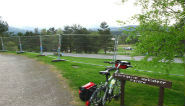
-
The Legacy of Nuclear Power: Part 1
Listen now to access more details of The Legacy of Nuclear Power: Part 1How do local communities respond to the risks and opportunities of nuclear power?

-
Researching cycling in the US & the UK
Listen now to access more details of Researching cycling in the US & the UKPeter Wood shares his experiences researching cyclists - on both sides of the Atlantic.

-
Why I believe 'yes' is only a matter of time
Listen now to access more details of Why I believe 'yes' is only a matter of timeDespite voters in 2014 choosing to stay in the United Kingdom, Gerry Mooney believes that in the long run, an Independent Scotland is inevitable. He explains why.

-
Family photos and what they mean
Watch now to access more details of Family photos and what they meanWhat can family photos tell us about households, gender roles and emerging technology? Professor Gillian Rose explores her research on family photography, and how this work interacts with her own experiences.

-
Coping on the Coast: moral economies and liminality at the heart of things that matter
Watch now to access more details of Coping on the Coast: moral economies and liminality at the heart of things that matterDoes geography influence peoples’ sense of security and well-being?

-
‘Citizen sensing’ and new forms of environmental monitoring
Read now to access more details of ‘Citizen sensing’ and new forms of environmental monitoringWhat technological challenges are faced by communities seeking to understand environmental change at different geographical scales?

-
Should we be worried about the US withdrawal from the Paris climate agreement?
Read now to access more details of Should we be worried about the US withdrawal from the Paris climate agreement?The UK government has confirmed that despite the path chosen by the US, the UK would honour the Paris Agreement. Here Shonil Bhagwat looks at the motivations and implications behind the US decision, and how international action on climate change will go on.

-
Should Economics and the Environment work together?
Listen now to access more details of Should Economics and the Environment work together?The recent UK general election saw many parties pledge to ‘improve’ the environment. Vicky Johnson considers progress can be measured by more closely connecting the environment to economics.

-
How is Milton Keynes a ‘smart’ city?
Watch now to access more details of How is Milton Keynes a ‘smart’ city?What is a ‘smart city’, and how is smart rooted into Milton Keynes’ past and future?

-
Milton Keynes and the roots of 'Smart' transport
Watch now to access more details of Milton Keynes and the roots of 'Smart' transportLearn about MK’s unique history of transport innovation, and how The Open University has been a part of the experiment.

-
Smart Cities in the Making: Learning from Milton Keynes
Watch now to access more details of Smart Cities in the Making: Learning from Milton KeynesWhy research Milton Keynes? Professor Gillian Rose introduces a study of how cities are increasingly using digital data to improve their management and create new ways of living.

-
Sir David Attenborough and The Open University
Watch now to access more details of Sir David Attenborough and The Open UniversitySir David Attenborough and The Open University have had a long-standing relationship since the university's birth. David explains how that relationship came about and how it has developed over the years.
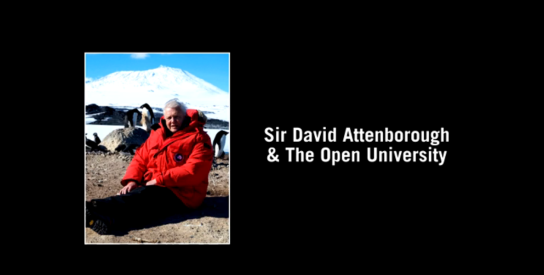
-
The Curious Geography of Weetabix: A Cereal Tale for Our Times
Read now to access more details of The Curious Geography of Weetabix: A Cereal Tale for Our TimesWhere is Weetabix actually from? Prof. John Allen investigates.

-
This is not a city: Milton Keynes
Read now to access more details of This is not a city: Milton KeynesWhat makes a city and why does it matter?

-
Europe’s Borders in Question
Read now to access more details of Europe’s Borders in QuestionStories about migrants, asylum seekers and refugees make media headlines almost every day. John Allen asks, what's the role of borders in this movement of people?

-
Introducing Geography Matters
Read now to access more details of Introducing Geography MattersThe 'Geography Matters' initative is coming to the Faculty of Arts and Social Sciences.

-
Brexit and the Irish border
Read now to access more details of Brexit and the Irish borderHow are Brexit and the Irish border connected? Dr Philp O'Sullivan reflects on the changing geographical relationship between the UK and Ireland.

-
Privatising Thames Water
Read now to access more details of Privatising Thames WaterHow did a public utlity turn into a financial instrument?

-
Seeing the internet
Read now to access more details of Seeing the internetHow do we see the internet? Gillian Rose explores why some artists and campaigners think it's important that the internet is made more visible.

-
Climate change: the kale smoothie of TV
Read now to access more details of Climate change: the kale smoothie of TVIs climate change the kale smoothie of TV schedules: unappealing but somehow fashionable and even essential to the diet?

-
The environmental costs of Trump’s wall
Read now to access more details of The environmental costs of Trump’s wallTrump's wall will not only have long-lasting impact on human society, but also severe ecological consequences.

-
Heathrow third runway: who and where will benefit?
Read now to access more details of Heathrow third runway: who and where will benefit?Exploring the costs and benefits of expanding Heathrow, using a geographical analysis.

-
Change in the West of Ireland
Read now to access more details of Change in the West of IrelandIntroducing a collection of articles asking 'How can unique and distinctive regions, like the West of Ireland, retain the qualities that make them unique while continuing to modernise and interact with the wider world?'

-
Scoring the Shoreline
Read now to access more details of Scoring the ShorelineGeorge Revill considers the synergy between sound waves and ocean waves - how the coast of Britain has inspired the nation's musical heritage.

-
London inside out
Read now to access more details of London inside outFifteen years since the 7/7 bombings, we look back at unity in London after the terror attacks...

-
Methods in Motion: Getting on your bike, and looking for answers
Read now to access more details of Methods in Motion: Getting on your bike, and looking for answersDr Peter Wood, a Visiting Fellow with the Geography Discipline, argues that although methodological choices are often seen as technical decisions, they can actually be key to intellectual creativity.

-
Is public spending a drain on the economy or the mark of a civilised society?
Read now to access more details of Is public spending a drain on the economy or the mark of a civilised society?Read this article outlining arguements in debate held under the auspices of the Social Sciences Student Connections, Big Conversation.

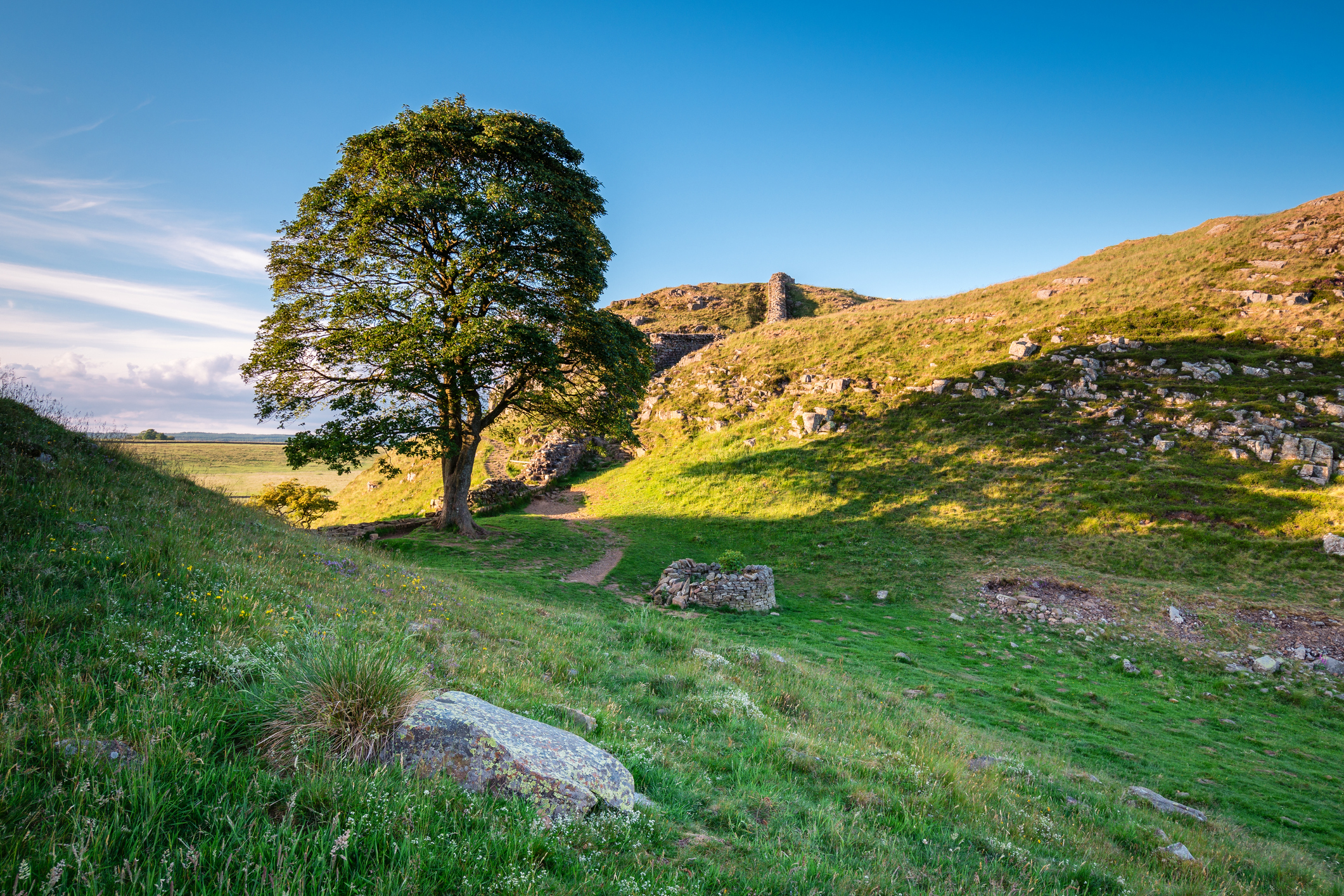
Rate and Review
Rate this article
Review this article
Log into OpenLearn to leave reviews and join in the conversation.
Article reviews